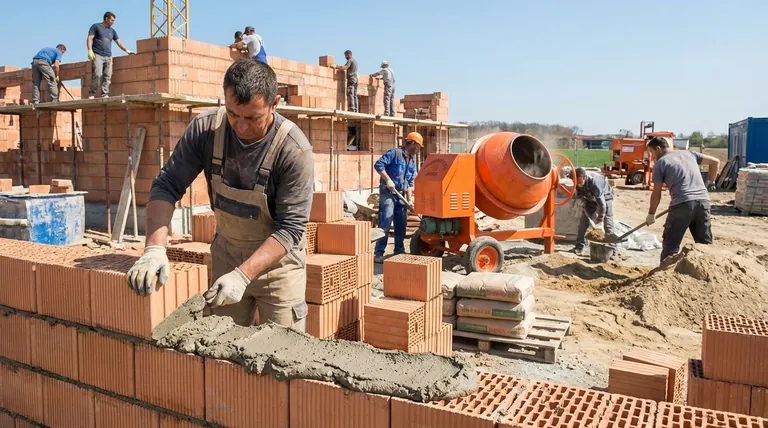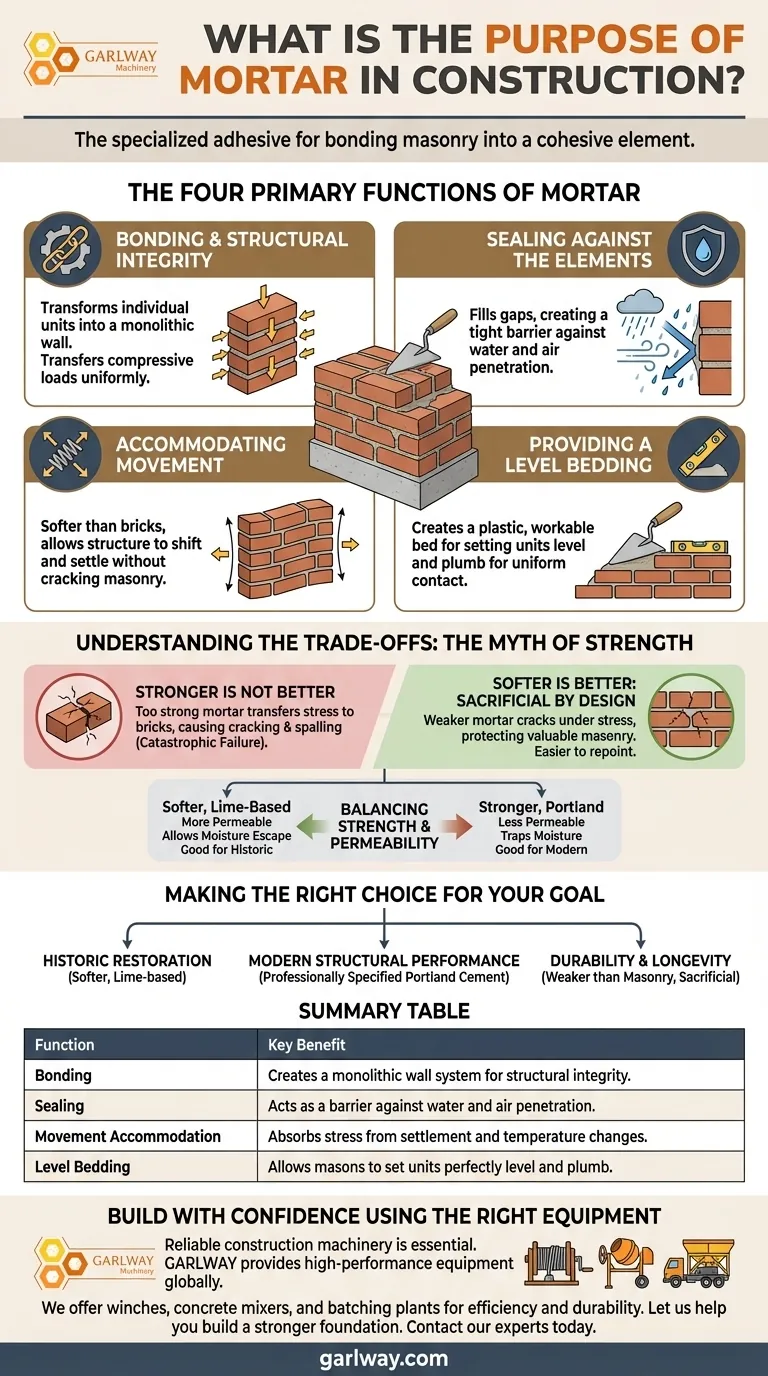At its most fundamental level, mortar is the specialized adhesive used in construction to bond individual masonry units—like bricks, stones, or concrete blocks—into a single, cohesive structural element. Its primary purpose is to act as a binding agent, holding the components together with its thick, adhesive consistency.
Mortar is more than just glue; it is a sacrificial, flexible element engineered to bind masonry units, seal joints against weather, and absorb stress to protect the more brittle bricks or blocks from damage.

The Four Primary Functions of Mortar
While we often think of mortar simply as the "stuff between the bricks," its role is far more sophisticated. It performs several critical functions simultaneously to ensure the longevity and stability of a structure.
Bonding and Structural Integrity
The most obvious purpose of mortar is to bond masonry units together. This transforms a simple stack of individual blocks into a monolithic wall system capable of resisting lateral forces like wind.
The mortar joint is responsible for transferring compressive loads uniformly from the unit above to the unit below, ensuring stress is distributed evenly throughout the wall.
Sealing Against the Elements
Mortar fills the gaps between masonry units, creating a tight seal. This joint is a critical barrier that prevents water and air from penetrating the wall assembly.
A properly executed mortar joint is a building's first line of defense against moisture intrusion, which can lead to significant damage over time.
Accommodating Movement
Buildings are not static; they shift, settle, and expand or contract with temperature changes. Mortar is designed to accommodate this movement.
It is intentionally engineered to be softer and more flexible than the bricks or blocks it surrounds. This allows the structure to move without placing excessive stress on the masonry units themselves.
Providing a Level Bedding
Masonry units are rarely perfectly uniform in size or shape. Mortar creates a plastic, workable bed that allows masons to set each unit perfectly level and plumb.
This ensures not only an aesthetically pleasing appearance but also uniform contact between units, which is essential for proper load distribution.
Understanding the Trade-offs: The Myth of Strength
A common misconception is that stronger mortar is always better. In reality, the most frequent cause of masonry failure is using a mortar mix that is too hard or strong for the job.
The "Softer is Better" Principle
Mortar should always be weaker than the masonry units it bonds. When a wall experiences stress from movement or settlement, that stress needs a release point.
If the mortar is too strong, it won't give. Instead, it will transfer the stress directly into the bricks or blocks, causing them to crack and spall—a catastrophic and expensive failure.
Sacrificial by Design
When a softer, appropriate mortar is used, it becomes the designated weak point. It will crack under extreme stress before the masonry does.
This is intentional. It is far easier and cheaper to repoint—or replace—cracked mortar joints than it is to replace entire bricks or rebuild a damaged wall. The mortar sacrifices itself to protect the more valuable masonry units.
Balancing Strength with Permeability
The hardness of a mortar also affects its ability to breathe. Softer, lime-based mortars are more vapor-permeable, allowing trapped moisture to escape from the wall.
Modern, high-strength Portland cement mortars can be so dense that they trap moisture within the masonry, leading to freeze-thaw damage and deterioration, especially in older buildings.
Making the Right Choice for Your Goal
The correct mortar formulation depends entirely on the materials being used and the long-term goal for the structure.
- If your primary focus is historic restoration: Use a softer, lime-based mortar that matches the original's strength and permeability to protect the old masonry.
- If your primary focus is modern structural performance: Use a professionally specified Portland cement-based mortar that provides the required compressive strength for new blocks or bricks.
- If your primary focus is durability and longevity: Always ensure the mortar is weaker than the masonry units, allowing it to function as a sacrificial element that absorbs movement and stress.
Understanding mortar's role as a flexible, protective partner to masonry is the key to building durable and long-lasting structures.
Summary Table:
| Function | Key Benefit |
|---|---|
| Bonding | Creates a monolithic wall system for structural integrity. |
| Sealing | Acts as a barrier against water and air penetration. |
| Movement Accommodation | Absorbs stress from settlement and temperature changes. |
| Level Bedding | Allows masons to set units perfectly level and plumb. |
Build with Confidence Using the Right Equipment
Just as the right mortar mix is crucial for a durable structure, reliable construction machinery is essential for your project's success. GARLWAY specializes in providing high-performance equipment for construction companies and contractors globally.
We offer a range of robust machinery, including winches, concrete mixers, and concrete batching plants, designed to deliver the efficiency and durability your projects demand.
Let us help you build a stronger foundation. Contact our experts today to discuss how our equipment can enhance your construction capabilities and contribute to the longevity of your structures.
Visual Guide

Related Products
- JDC350 Small Cement Concrete Mortar Mixer
- Auto Concrete Cement Mixer Machine New
- Commercial Construction Mixer Machine for Soil Cement Mixing Concrete
- Construction Products Concrete Plant Machine Mixing Concrete Mixer
- Portable Electric Concrete Mixer Machine for Cement Mixing
People Also Ask
- What components are involved in the operation of a hydraulic winch? Master the Power System for Heavy Lifting
- What are the advantages of using winch machines over manpower? Boost Safety & Efficiency in Heavy Lifting
- Why should you not rely solely on the trailer winch to secure a boat? Avoid Catastrophic Failure on the Road
- What are the key safety considerations when using an electric hoist? Ensure Safe Lifting Operations
- In what types of applications can hydraulic towing winches be used? Essential for Marine, Construction & Recovery
- What are the three positions of a winch's ratchet latch? Master Safe & Efficient Operation
- How have winches evolved in modern times? From Manual Cranks to Smart, Powerful Systems
- What are the advantages of ready-mixed mortar compared to on-site mixing? Boost Quality and Efficiency



















